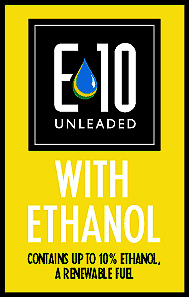Recent proposals aimed at improving air quality may unconstructively impact many boater owners. It's been discovered that E-10 gasoline is causing a number of problems to powerboat owners, especially those with older boats.
The U.S. Environmental Protection Agency (EPA) is requiring the use of oxygenated gasoline in an effort to improve air quality and numerous areas around the country are using an additive called Methyl Tertiary-Butyl Ether or MTBE, however due to its own environmental problems, ethanol is quickly replacing it. Ethanol is a high octane, biodegradable ethyl alcohol produced from renewable resources such as grain or wood. Because ethanol contains 35 percent oxygen by weight, it reduces carbon monoxide tail pipe emissions. Ethanol is blended with low octane fuels to produce a mix that is comparable to other fuels and blends of 10% percent ethyl alcohol and gasoline known as E-10 gas is now commonplace at all gas stations and marina fuel docks across the country.
Ethyl alcohol is a chemical solvent capable of causing damage to the sealants especially those used on older fiberglass fuel tanks resulting in leakage and potential fire hazards. Also because it's a superb solvent, ethyl alcohol has a cleaning effect on other tanks resulting in the release of fine particles which pass through most fuel filters. These result in clogged fuel injector nozzles, carburetors, fuel system blockages, engine damage, and increased water fuel contamination most commonly known as phase separation.
Ethanol is hydroscopic, meaning it adsorbs water. When added to a water contaminated a fuel tank it combines together to produce a noncombustible layer of liquid that settles to the bottom of the tank. This is common during long storage periods.
Since fuel tanks have little room for expansion keeping it full limits the flow of air in and out of the vent thus reducing the chance of condensation (water) resulting from fluctuating temperatures. Whenever, water enters the E-10 fuel it quickly reacts with the ethanol thereby inviting phase separation. Once tanks are contaminated the only solution is completely draining the tank of fuel and water. This procedure is costly and dangerous and should be le ft to the professionals.
It appears the best defense for boaters is to keep your fuel tank clean of water and use adequate fuel filters and additives. There are fuel additives to help prevent phase separation and fuel gelling, thus helping to eliminate ethanol-related fuel problems. Most have an enzyme fuel additive that helps prevent phase separation by de-ionizing the fuel or neutralizing the electrical charges between water molecules. The de-ionization process breaks the electric bond of the water molecules preventing them from forming into large clusters or drops that settle to the bottom of the fuel tank. I use a Racor brand water separating fuel filter and fuel additives.
Captain Woody Gore Tampa Bay Fishing
www.captainwoodygore.com
wgore@ix.netcom.com
813-477-3814



